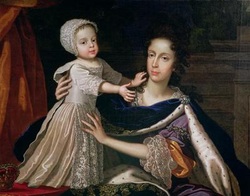 The original rock-a-bye baby Why is my five-year old speaking caustically about the French Revolution? How is he able to make critical remarks about England's Glorious Revolution? I mean, he's brilliant and all (I joke!) but really! How does he know about such things? Well, the short answer is, he doesn't. He's just chanting words many of us learned when we were kids, about Jack and Jill and babies rocking in tree tops. Mother Goose Rhymes? Nope, try re-appropriated tavern songs and ballads. (Similar to "Ring-Around-the-Rosy's" dismal connection to the Bubonic Plague and the Danse Macabre. I'd have talked about that, but that's old hat! Old hat?) Next time you're humming that old tavern tale, er, nursery rhyme "Rock-a-bye baby," imagine the real context. It's 1688. Protestant England is being ruled by James II. Despite the King's overt Catholic tendencies, Parliament and the people are generally fine with their ruler. After all, in due time, his daughter Mary--married to William of Orange, a good Protestant--would inherit the throne. But when rumors start to spread that the Queen had secretly borne a male heir--or stolen a child, smuggled into England in a warming pan, if you can believe THAT!-- a child who would surely return the country to Catholicism, the people rebelled. They overthrew James II, cast off the baby, and gave the throne to Mary to rule jointly with her husband. So how is all this revealed in the most everyday of songs? Check it out! "Rock-a-bye, baby" (the warming pan baby, James III) "On the tree tops" (I think the tree represents the English monarchy) "When the wind blows" (the Protestant wind blowing in from the Netherlands, with William and Mary) "The cradle will rock." (The cradle is the monarchy being rocked). "When the bough breaks," (Again, the tree) "The cradle will fall, and down will fall baby, cradle and all." (The End of the English monarchy!! Huzzah!) A whole different perspective, right? But the other story--Jack and Jill--tells a much more bloody tale. Well, okay, some say "Jack and Jill" is referring to the economic downturn in early seventeenth century England. In this version, Charles I commanded that the volume of a 'Jack" (1/2 pint) be lowered because it was too costly ("broke the crown"), and the "Jill" (or gill, 1/4 pint) came tumbling after. But that's less fun. I like the version that ascribes the nursery rhyme's origins to the French Revolution. Very simply: "Jack and Jill" (the luckless King Louis XVI and his wife, the much maligned Marie Antoinette) "Went up the hill" (They mounted the scaffold in 1793. You see where I'm going here?) "To fetch a pail of water." (Okay, not sure about this line! any thoughts?) "Jack came down, and broke his crown," (Executed by the slicing dicing guillotine) "And Jill came tumbling after." (Marie Antoinette executed a few months later. That guillotine was awfully efficient. But again, the end of a monarchy.) What do you think? Fun stuff, right?
13 Comments
Shyanmei
1/9/2012 12:41:33 pm
Who knows that conspiracies lie in children songs?! I now think twice when I sing "Ring around the Rosie's" to Rosie.
Reply
Or you can just do what I do, make up new words so they know what you're singing about. "I am carrying flowers, to ward off the plague, uh oh I got it, we all fall down!" I call it the new historical realism.
Reply
Vas
1/9/2012 09:03:34 pm
Good stuff! Keep these coming...!
Reply
bekerys
1/10/2012 04:13:54 am
Oh no! My favorite nursery rhymes as acts of sedition! Now you have me thinking (not always a good thing), what about "Georgie Porgie", and "Mary Mary Quite Contrary"? Good English Royal names! Or the one about the little girl who had a little curl right in the middle of her forehead? I can only imagine what these really mean! guess I will have to go look it up!
Reply
Beckerys--That's funny. Georgie Porgie is allegedly about the Duke of Villiers, Charles I main advisor, who had a reputation at the Stuart Court. Mary Mary may have referred to Bloody Mary (Mary I)--the daughter of Henry VIII and Catherine of Aragon, who wanted to return England to its Catholic roots. hard to find real evidence of some of this stuff, but its fun to speculate!
Reply
bekerys
1/10/2012 04:45:20 am
So I looked up the little girl little curl rhyme. It is by Henry Wadsworth Longfellow (I'm sure you all knew that) and is said to reference a time when he was walking the floor with his infant daughter, who for some reason simply did not want to sleep. So no acts of sedition there, whew!
Reply
Matt
1/10/2012 09:03:13 am
I'd love to know if there is a hidden meaning in Kookaburra--perhaps Australians used it to laugh at the ridiculous royals, sitting high atop their (family) tree, living their fancy lives, eating all the gumdrops they see. Or, maybe it's about a carniverous bird.
Reply
Matt, that one seems a little more straightforward, written in 1934 by an Australian girl guide. But apparently, Men at Work may have plagiarized the song in their ever-classic tribute to "a land down under where beer does flow and men chunder". :-)
Reply
bekerys
1/11/2012 05:10:21 am
And what, exactly, is "chunder" when its at home?
Jennie
1/15/2012 10:06:32 pm
Hmmm, I may have to incorporate a 17th century story time into one of my sessions! :-)
Reply
Leave a Reply. |
Susanna CalkinsHistorian. Mystery writer. Researcher. Teacher. Occasional blogger. Categories
All
Archives
May 2023
|
 RSS Feed
RSS Feed